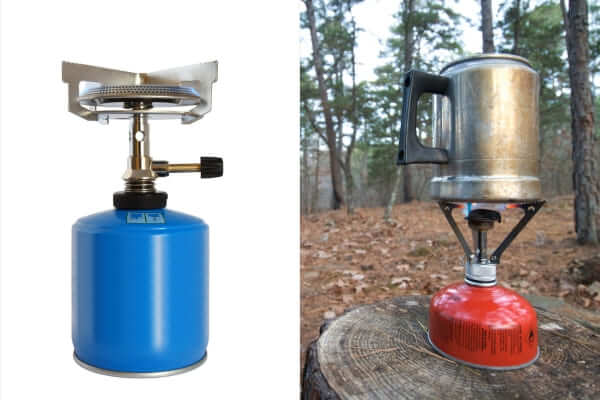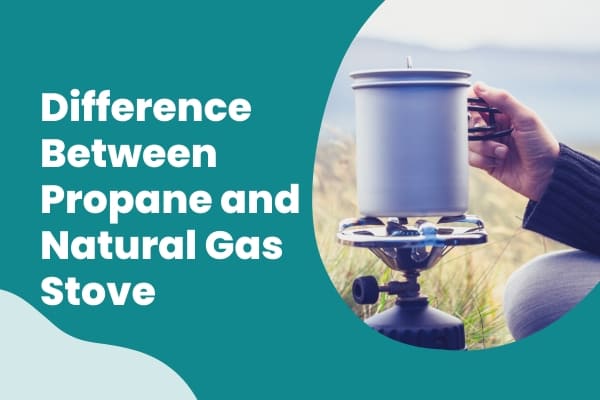Are you a camping enthusiast or someone who loves outdoor cooking? If so, having a reliable stove is crucial. When it comes to portable cooking solutions, butane, and propane stoves are two popular choices.
This article explores these stoves’ differences, properties, advantages, and disadvantages. Both butane and propane are combustible gases composed of carbon and hydrogen atoms. Butane has four carbon atoms, while propane has three. Butane stoves are known for their efficiency, cost-effectiveness, and compactness, while propane stoves offer greater heat output and versatility.
We’ll help you decide which stove best suits your outdoor cooking adventures by comparing cost, efficiency, safety, and environmental impact.
Butane and Propane: What are they?

Butane and propane are fascinating substances used in various applications, including portable stoves and lanterns. Let’s delve into their definition and properties to understand them better.
Firstly, butane and propane are organic molecules classified as hydrocarbons due to their carbon and hydrogen atoms composition. They exist as gases at room temperature and under normal atmospheric pressure. One intriguing fact about these gases is their combustibility. When burned, they release heat energy, carbon dioxide, and water vapor.
Now, let’s explore the differences between butane and propane. The main distinction lies in the number of carbon atoms in their molecules. Propane contains three carbon atoms, while butane has four. This variance in molecular structure leads to different properties and behaviors.
Another distinction is the boiling point. Propane has a lower boiling point than butane, enabling it to function effectively in colder temperatures. Additionally, propane exerts higher pressure due to its lower boiling point, making it suitable for various applications.
In terms of physical state, butane is a liquid at room temperature, while propane remains a gas. This difference affects their storage requirements. Butane is better suited for indoor storage, while propane can be safely stored outdoors.
Regarding efficiency in portable stoves and lanterns, butane takes the lead. Unlike propane, it doesn’t require pressurization, making it a convenient choice for portable applications.
Understanding these differences between butane and propane sets the foundation for choosing the right fuel for your needs. Whether you’re embarking on outdoor adventures or require a reliable heating solution, considering the properties and characteristics of these gases will help you make an informed decision.
Butane Stoves
Butane stoves are portable cooking appliances that rely on canisters filled with compressed flammable gas, specifically butane, to generate a flame for heat. These stoves are designed to be lightweight and compact, making them ideal for backpacking and outdoor activities. The canisters for butane stoves typically hold around eight ounces of fuel, although more extensive options are available for stoves with multiple burners. While butane may be less standard than propane, it remains a popular choice for its convenience and ease of use.
Whether setting up a single burner on a level surface or opting for a two-burner stove, butane stoves offer versatility and affordability. Additionally, they come in various models with different burn times, heat outputs, and ignition methods, ensuring a suitable option for every user’s needs.
Advantages of butane stoves:
- Smaller and lighter compared to propane stoves.
- Offered in both single and double burner options.
- Portable, allowing for an easy transition from inside a camper to an outdoor picnic table.
- Often come with a practical carrying case.
- Butane fuel canisters take up less storage space than propane.
- Canisters typically come in 8-ounce sizes, facilitating stacking in RV cabinets or pantries.
- Less expensive and less toxic compared to propane fuel.
- Burn about 10 to 12 percent more efficiently than propane in similar environments.
Disadvantages of butane stoves:
- Require usage in a well-ventilated area, similar to propane stoves.
- Not suitable for heating campers or trailers.
- Efficiency drops significantly in colder temperatures, with complete vaporization ceasing around 30 degrees Fahrenheit.
- Safety of butane fuel relies on the stove itself; ensure the furnace has a functional shut-off valve to prevent overheating and potential explosions. Choose a high-quality stove and carefully follow the provided instructions.
Propane Stoves
Propane stoves are popular cooking appliances that utilize canisters filled with compressed flammable gas, specifically propane, to generate a flame for heat production. Propane is a versatile and clean-burning fuel that finds application in various settings, including home heating. Propane-powered space heaters, for instance, serve as excellent supplemental heating sources and offer numerous advantages. Not only is propane more cost-effective than electricity, but it also provides a safe and efficient heating option. Propane space heaters often have safety features like tip-over switches and oxygen depletion sensors, ensuring user protection.
Advantages of propane stoves:
- Versatile fuel for powering generators, gas fireplaces, and cooktops.
- Cheaper than electricity and provides more units of energy.
- Efficient burning fuel with a shorter energy savings payback period.
Disadvantages of propane stoves:
- Difficulty in switching propane suppliers due to tank ownership.
- Lack of transparency in pricing comparisons.
- Propane tends to be more expensive than heating oil.
Comparison between Butane and Propane Stoves
When comparing butane and propane stoves, several factors include cost, efficiency, safety, and environmental impact.
Cost: Regarding cost, butane stoves generally have lower prices than propane stoves. However, it’s essential to consider long-term costs and efficiency. Propane stoves may have higher upfront costs, but their energy efficiency can make them more cost-effective.
Efficiency: Propane stoves have the upper hand when it comes to efficiency. They are more energy-efficient than butane stoves, producing greater heat output per unit volume. This efficiency can result in fuel savings and more effective cooking or heating performance.
Safety: Both butane and propane stoves should be used in well-ventilated areas to ensure proper combustion and prevent the buildup of harmful gases. Propane stoves often have safety features such as tip-over switches and oxygen depletion sensors, providing protection.
Environmental impact: Considering the environmental impact, propane stoves are generally more environmentally friendly than butane ones. Propane produces fewer emissions during combustion, resulting in lower air pollution. Butane stoves, conversely, may contribute more to air pollution due to their higher emissions.
Which is better, butane or propane stove?
The choice between a butane or propane stove ultimately depends on the individual’s needs and preferences. Both options offer their own set of advantages and considerations.
Butane stoves have the advantage of being more affordable and readily available compared to propane stoves. The cost of butane fuel is also generally lower, making it a more economical choice. Additionally, connecting butane fuel is easier and more convenient.
However, it’s important to note that butane stoves tend to be bulkier and slower to heat up. Refilling the fuel requires a unique tool, which may inconvenience some users.
On the other hand, propane stoves utilize propane fuel, which is widely accessible and offers a cleaner burning experience with less smoke. Propane stoves also come in a wider variety of designs and are generally more compact and portable.
However, propane stoves are typically more expensive than butane stoves. They may also have slightly lower heat output and require more effort in terms of setup.
Ultimately, the decision between butane and propane stoves comes down to budget, ease of use, heating efficiency, and personal preferences. Considering these aspects will help determine which option aligns best with an individual’s specific requirements.
FAQs
Is It Cheaper to Cook with Butane or Propane?
The cost of cooking with butane or propane depends on a number of factors, including the fuel price, the stove’s efficiency, and the amount of cooking you do. Propane is generally cheaper than butane; butane stoves are more efficient. So, if you cook a lot, butane may be the more economical choice.
Is a Butane Stove the Same as A Propane Stove?
No, butane and propane stoves are not the same. Butane stoves use butane gas as fuel, while propane stoves use propane gas. Butane has a lower boiling point than propane, so it vaporizes at a lower temperature. This means that butane stoves are less effective in cold weather. On the other hand, propane stoves are more effective in cold weather but are also heavier and more expensive.
Is It Safe to Use a Butane Stove Indoors?
It is only safe to use a butane stove indoors if it is specifically designed for indoor use. Butane stoves not designed for indoor use can produce carbon monoxide, a deadly gas. If you consider using a butane stove indoors, read the manufacturer’s instructions carefully.
Conclusion
In conclusion, when choosing between a butane or propane stove, it’s essential to consider your unique needs and priorities. Butane stoves offer affordability and easy availability, while propane stoves provide cleaner burning and more excellent design choices.
Cost, fuel efficiency, portability, and ease of use significantly determine the better option for you. Whether you opt for the compact convenience of butane or the cleaner burn and more comprehensive design selection of propane, both stoves offer reliable heating solutions for various outdoor and indoor applications. Choose the one that suits your requirements and confidently embark on culinary adventures.






